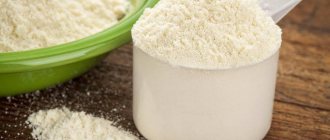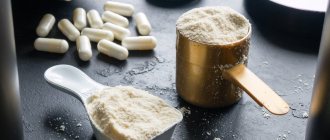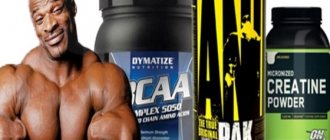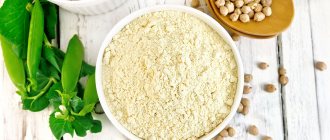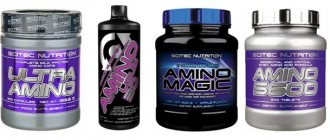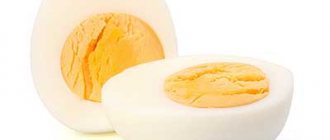Dairy products
Cottage cheese, kefir, yogurt, yogurt, fermented baked milk and any other milk-based products contain at least 8 g of protein. These foods are often enriched with many useful substances, so they should definitely be included in your diet.
Casein is a protein from low-fat cottage cheese that is 97% digestible and does not overload the body with extra calories.
Greek yogurt, which contains 10 g of protein, is especially beneficial. This low-fat product is rich in probiotics, B vitamins, magnesium and calcium. In addition to casein, yogurt contains whey protein. Their combination significantly reduces the amount of lactose. Therefore, yogurt is a great option for those who are lactose intolerant.
What are proteins?
Protein food - food for athletes
Protein plays an important role for athletes who build muscle mass. It is the building material for muscles. Therefore, it is very important in such cases to provide complete and balanced protein to the body.
For this purpose, special preparations called proteins are produced. They are usually consumed as a protein shake. When it enters the human body, it is digested and broken down into its constituent elements, which are called amino acids. It is in this form that the absorption of proteins by the human body occurs.
Athletes' protein needs are greater than those of ordinary people. Of course, you can also ensure that you get the right amount of protein by eating more food. However, in some cases it can lead to obesity. Therefore, it is customary to use special products for this purpose.
At the same time, they perform another important function for the body: maintaining the natural nitrogen balance. This indirectly supports the processes of creating muscle tissue. Proteins contain not only the protein itself, but also some components that facilitate its absorption. There are several main types of protein used.
One of them is called serum. The name reflects that fact. That it is produced from whey. The protein content of this protein is twenty percent. An important feature of this type of protein is that it contains all the essential amino acids.
Another important feature is the high rate of protein absorption by the body. It is recommended to consume in short portions several times a day. Another type of protein is milk. It contains 20% whey protein and 80% casein protein. It is an unseparated mixture of proteins and is characterized by an average rate of absorption.
Soy protein contains plant-based protein. It contains the entire complex of amino acids (including essential ones) that are needed for muscle growth.
As you know, some people for some reason cannot consume milk protein. This may be the best option for them. Protein is absorbed slowly and has an effect on lowering cholesterol in the blood. Egg protein is characterized by the highest rate of absorption by the human body.
Despite its high biological activity, it is not widely distributed on the market due to its relatively high cost. Casein protein is produced from dairy products. Despite the fact that it is absorbed slowly, its use allows the athlete to ensure a long-term and balanced supply of protein to the body.
Cereals
It was not for nothing that Hercules received its name in honor of the ancient Greek hero. Oatmeal (rolled oats) contains 10–12 g of protein, as well as all minerals and vitamins. Oatmeal is easily digestible, so this porridge will give you strength for the whole day. There is an exotic type of cereal - quinoa, which contains 14 g of protein. This is one of the most useful products, which, unfortunately, is not always easy to find in stores. On average, grains contain 6 g of protein and many other healing substances.
What are proteins?
Protein can be of plant or animal origin
Basically, proteins enter the body along with various meat and dairy products. This is not only meat, fish and milk itself, but also cottage cheese, cheese, eggs, poultry and other similar products. But these are not the only sources of protein for the human body. This protein is usually called animal protein.
Another source of protein is plant foods. The most valuable sources of this kind include: peas, beans, mushrooms and nuts. Those who do not eat animal products can get the protein they need from these types of plant foods.
Which type of protein is healthier? The one that comes with animal foods or the one that comes with plant foods? Animal protein is richer, higher quality and balanced in composition.
As you know, the human body’s protein needs include the need to obtain about a hundred different amino acids in the right quantities. This kind of food contains all the necessary elements.
Products of plant origin contain mainly those proteins that are involved in the growth of various tissues and organs. Fruits and berries have the lowest protein content compared to other products.
Mushrooms
Mushrooms contain about 3.1 g of protein, but are composed entirely of protein. The following types of mushrooms are extremely useful: shiitake, chaga, honey mushrooms, boletuses, porcini mushrooms, boletus mushrooms. They can be added to soup or cooked in any form: boiled, dried, fried. It is very important to choose mushrooms collected from environmentally friendly places, because mushrooms absorb substances from the environment.
Foods that contain a lot of protein should be eaten every day. It is very harmful to refuse such food, but you should not abuse it either. You can prepare a variety of dishes by adding protein foods to them.
What is protein and how much does the body need?
Protein is found in different foods, but in different amounts.
The human body requires many different substances for a healthy life. Protein is one of the main such materials. It performs several different functions in the body.
Protein can be called the main building material that is necessary for the restoration of various tissues.
In addition, as is known, in the human body there is a constant breakdown of old cells and a constant growth of new ones, leading to the actual renewal of the human body on an irregular basis. This can be called the main function of protein, but it is not the only one.
The activity of various enzymes plays an important role in the body. All components that participate in it have protein components and will not function without this material. If there is a lack of protein in the body for one reason or another, they will not be able to function normally.
Everyone knows that oxygen is vital for life. As you know, it is transported inside the human body using hemoglobin, which is a protein compound.
Every day a person spends a certain amount of protein on his life activities, which must be replenished in full. In what ways is this usually done? Of course, the largest part of the proteins that enters the human body comes with food. However, there are other ways.
The fact is that proteins are quite complex organic compounds. In order to assimilate them, it is usually necessary to chemically break them down into their component parts - amino acids. After this, the proteins it needs are synthesized inside the body.
Need for professional advice
Given the enormous variability in all of the above factors, the issue of creating an individual nutrition plan for muscle building is best discussed with a competent sports coach.
This simple solution saves athletes from incredibly troublesome activities such as:
- searching for formulas for calculating norms of consumption of food elements depending on age, gender, height and weight;
- searching for reliable tables of nutritional value of individual products, including in connection with the method of their preparation;
- experimental selection of the optimal diet, including water consumption;
- determining the advisability of taking vitamin-amino acid food supplements.
By following the trainer’s recommendations, you can notice an increase in muscle mass after just 1-2 months of training, which not only speeds up the time of achieving your goals, but also incredibly motivates you for further training, because a person immediately sees the results.
Excess protein in the body
Of course, protein is vital for the body. But can it be used without any measure and what could be the danger? The absorption of excess protein requires a lot of calcium, which for this will be extracted from other tissues and organs of the body. It usually comes from bones. In this case, the body does not have time to compensate for it and the bones become fragile, and osteoporosis may develop.
Eating too much protein can also lead to elevated cholesterol levels, which increases your risk of developing heart disease. Also, an excess of protein can lead to a deficiency of vitamins in the human body.
Proteins are essential amino acids, as this video will prove:
Basics of a sports diet
Although protein foods are indeed the cornerstone of sports nutrition for muscle building, reducing the entire diet to calculating the daily protein intake would be completely wrong. Human metabolism is quite complex, and therefore focusing on one element only leads to physiological dysfunctions and disorders.
When creating a nutrition schedule, an athlete has to look for a balance in daily consumption of all components of a healthy diet.
Protein
In approximate terms, an athlete needs to consume about 2 grams of protein per kilogram of weight to ensure a stable increase in muscle mass. However, it should be noted that such advice is akin to measuring the average temperature in a hospital, since much depends on gender, age, intensity and type of activity, etc.
In general, when training to build muscle, protein in the diet should be about 25-30%, but no more, so as not to provoke gastrointestinal dysfunction, the development of autoimmune diseases or enzymatic liver disorders - characteristic consequences of an excess of protein in the body.
Fats
It is recommended that fat in the diet be at least 20%, but this issue also has its own nuances. On the one hand, a lack of fat leads to a disruption in the absorption of fat-soluble vitamins (A, D, E, K), as a result of which the entire metabolism suffers - and the full absorption of protein in particular. In addition, with a deficiency of fat, hormonal synthesis and cellular regeneration are disrupted, and the “wear and tear” of joints is accelerated.
On the other hand, there is an opinion that saturated fatty acids interfere with the gain of muscle mass, and therefore athletes need to consume only certain types of fat-containing foods, and strictly balance animal and plant fats.
Carbohydrates
Carbohydrates, as the main source of energy intensively “burned” during training, should make up about 50-60% of the diet - but these figures are also approximate and should be adjusted individually.
Calcium
Adequate amounts of calcium during strength training are necessary for three reasons:
- to regulate muscle contractions (including cardiac ones) and prevent a decrease in strength indicators;
- to compensate for the increased consumption of calcium observed under any stress, including intense physical activity;
- in order to prevent disturbances in the synthesis of hormones and neurotransmitters.
It is important to consider that an overdose of calcium leads to muscle cramps, cardiac arrhythmia, cholelithiasis and urolithiasis, arthritis and other dangerous disorders. Therefore, increasing your calcium intake needs to be done very delicately.
Vitamins and minerals
We should not forget that for complete absorption of protein in the body there must be a sufficient amount of vitamins C, B3 (PP), B6, B9 (folic acid) and D, as well as zinc (Zn) and iron (Fe).
At the same time, any vitamin and mineral imbalance inevitably leads to metabolic disorders and, as a result, a slowdown in muscle mass growth - not to mention health problems.
Meal schedule
The most difficult part of the diet program for gaining muscle mass. Depending on the characteristics of your training, you may need to take protein foods according to the following schemes:
- 1-2 hours before classes;
- 30-40 minutes after training;
- at certain time intervals (every 3-4 hours).
Summing up
Summarizing all of the above, I would like to say the following: sports nutrition is a voluminous, complex science, in some ways bordering on medicine, and therefore, just as no one in their right mind would self-medicate using a medical encyclopedia, so an athlete aimed at fast gaining muscle mass, will never try to put his finger on the sky, drawing up a schedule and diet at random, without consulting a specialist.
However, each person makes the final decision in this matter for himself.
